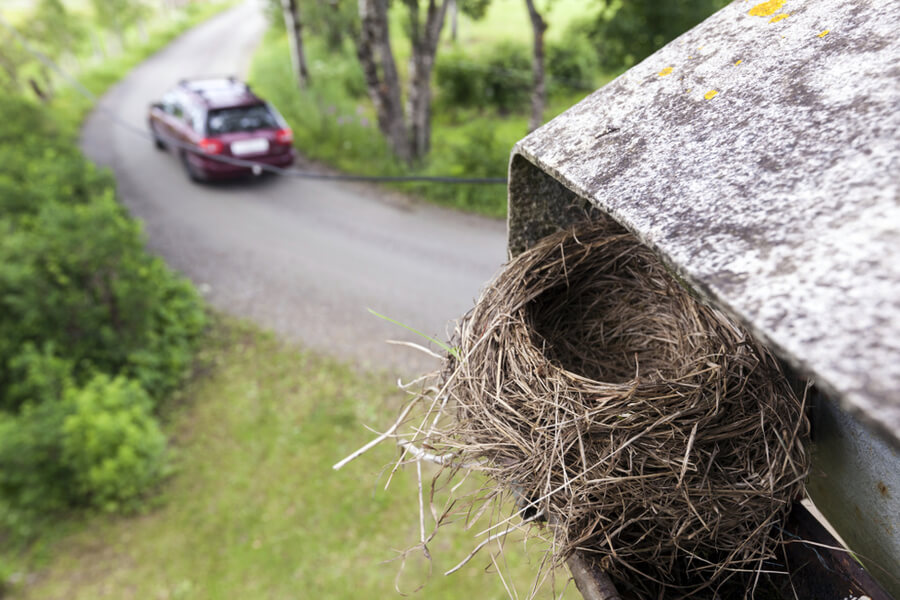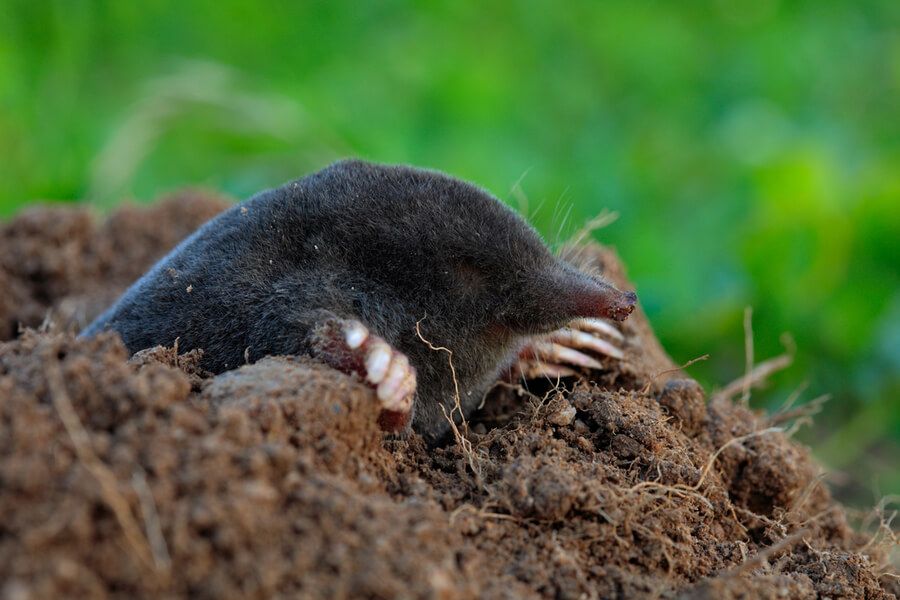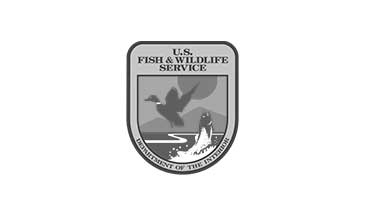Why did the bird build its nest here?
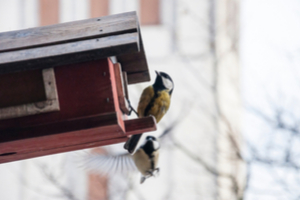 Many species of birds commonly build nests on or near human structures, for all kinds of reasons. It doesn’t necessarily have anything to do with your property, specifically. It may just so happen that your home fits all the criteria for an ideal bird nesting location. Birds like to build their nests in high areas surrounded by natural cover. That way, they can easily survey the surrounding landscape, and they can keep their nests relatively hidden.
Homes and other man-made structures provide other natural incentives for nesters, too. Egg-stealing predators often won’t approach a home or other manmade structure. Garbage or bird feeders may provide a reliable and easily-accessible source of food. Gardens or manicured soil may even foster earthworms for birds to feed on. If your property seems like a hotspot for birds, start looking for reasons why. Clearing yard debris or trimming down overgrown shrubs may make your yard and home less welcoming to nesting birds.
Many species of birds commonly build nests on or near human structures, for all kinds of reasons. It doesn’t necessarily have anything to do with your property, specifically. It may just so happen that your home fits all the criteria for an ideal bird nesting location. Birds like to build their nests in high areas surrounded by natural cover. That way, they can easily survey the surrounding landscape, and they can keep their nests relatively hidden.
Homes and other man-made structures provide other natural incentives for nesters, too. Egg-stealing predators often won’t approach a home or other manmade structure. Garbage or bird feeders may provide a reliable and easily-accessible source of food. Gardens or manicured soil may even foster earthworms for birds to feed on. If your property seems like a hotspot for birds, start looking for reasons why. Clearing yard debris or trimming down overgrown shrubs may make your yard and home less welcoming to nesting birds.
Will this nest cause problems?
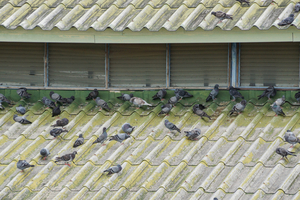 Unfortunately, it could. Birds can be household pests for several reasons. Their droppings can be a health or property hazard--plus they’re just gross. Depending on where the nest is, it could disrupt important home functions by blocking gutters or ventilation systems. Loud birds could wake you up too early or keep you up at night. Rarely, mother birds could even react defensively to perceived threats. There’s also the concern that birds could accidentally make their way indoors or hurt themselves on windows.
Some of the problems birds can cause tend to be exacerbated specifically when they choose to nest nearby. For instance, birds build their nests out of any nearby material they can get their beaks on. If they build near your home, that might mean materials you’d rather they didn’t use. Birds have been known to damage insulation, shingles, siding, and other housing materials to grab nesting materials. These nests also tend to be a source of the parasites that spread the diseases associated with birds.
Unfortunately, it could. Birds can be household pests for several reasons. Their droppings can be a health or property hazard--plus they’re just gross. Depending on where the nest is, it could disrupt important home functions by blocking gutters or ventilation systems. Loud birds could wake you up too early or keep you up at night. Rarely, mother birds could even react defensively to perceived threats. There’s also the concern that birds could accidentally make their way indoors or hurt themselves on windows.
Some of the problems birds can cause tend to be exacerbated specifically when they choose to nest nearby. For instance, birds build their nests out of any nearby material they can get their beaks on. If they build near your home, that might mean materials you’d rather they didn’t use. Birds have been known to damage insulation, shingles, siding, and other housing materials to grab nesting materials. These nests also tend to be a source of the parasites that spread the diseases associated with birds.
Will a mother bird abandon its nest if I disturb it?
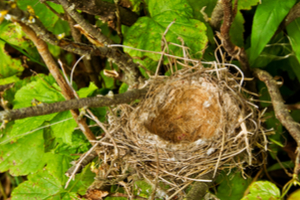 It’s possible, but less likely than you might think. Remember, the bird chose to build its nest near your home for a reason. Birds like being close to humans because our presence gives them an extra level of protection from predators. That means they’re not only aware of our presence, but they’re also utilizing it for their own purposes. A little noise or movement usually won’t be enough to scare a mother away from its babies.
This myth stems from the notion that birds have a highly-developed sense of smell that serves as a “human detector”. In reality, birds don’t have a great sense of smell and aren’t terrified of human scent. That doesn’t mean you should feel free to disturb the nest as much as you want, however. Mother birds really will abandon their nests in response to major, continual disturbances. It’s just not as likely as you may believe.
It’s possible, but less likely than you might think. Remember, the bird chose to build its nest near your home for a reason. Birds like being close to humans because our presence gives them an extra level of protection from predators. That means they’re not only aware of our presence, but they’re also utilizing it for their own purposes. A little noise or movement usually won’t be enough to scare a mother away from its babies.
This myth stems from the notion that birds have a highly-developed sense of smell that serves as a “human detector”. In reality, birds don’t have a great sense of smell and aren’t terrified of human scent. That doesn’t mean you should feel free to disturb the nest as much as you want, however. Mother birds really will abandon their nests in response to major, continual disturbances. It’s just not as likely as you may believe.
How can I avoid hurting the nest or its occupants?
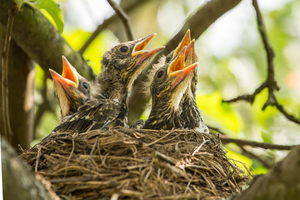 In general, we recommend keeping a healthy distance from the nest whenever possible. Try not to approach the area where the nest is if possible. If you need to approach the area where the nest is, try to do so slowly and gradually. If you can help it, don’t use doors and/or windows that might upset the nest or its occupants.
Make sure the rest of your home’s occupants know where the nest is and how to avoid bothering it, too. It might be helpful to put up a note reminding everyone of where the nest is and how to avoid it. Remember: birds don’t nest forever. The typical songbird’s nesting cycle is around four weeks. After the young birds leave the nest, the mother will abandon it, too.
In general, we recommend keeping a healthy distance from the nest whenever possible. Try not to approach the area where the nest is if possible. If you need to approach the area where the nest is, try to do so slowly and gradually. If you can help it, don’t use doors and/or windows that might upset the nest or its occupants.
Make sure the rest of your home’s occupants know where the nest is and how to avoid bothering it, too. It might be helpful to put up a note reminding everyone of where the nest is and how to avoid it. Remember: birds don’t nest forever. The typical songbird’s nesting cycle is around four weeks. After the young birds leave the nest, the mother will abandon it, too.
Should I move the nest?
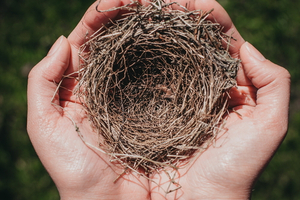 No. We strongly recommend against removing a nest without professional assistance. First of all, depending on the type of bird nesting, interfering with the nest could be illegal. Most native bird species are protected by various local, regional, or national wildlife laws. If you remove a nest without knowing what kind of bird you’re displacing, you could be subject to fines.
Even if the bird nesting on your property isn’t protected, we recommend against removing the nest yourself. A professional can remove a nest more safely and effectively than you could. Even more importantly, a professional could help you prevent birds from coming back again.
If you’re having bird problems of any kind, give Varment Guard a call any time. We have the tools and experience necessary to safely and effectively remove bird nests. We can also ensure the birds don’t come back to nest again.
No. We strongly recommend against removing a nest without professional assistance. First of all, depending on the type of bird nesting, interfering with the nest could be illegal. Most native bird species are protected by various local, regional, or national wildlife laws. If you remove a nest without knowing what kind of bird you’re displacing, you could be subject to fines.
Even if the bird nesting on your property isn’t protected, we recommend against removing the nest yourself. A professional can remove a nest more safely and effectively than you could. Even more importantly, a professional could help you prevent birds from coming back again.
If you’re having bird problems of any kind, give Varment Guard a call any time. We have the tools and experience necessary to safely and effectively remove bird nests. We can also ensure the birds don’t come back to nest again.

